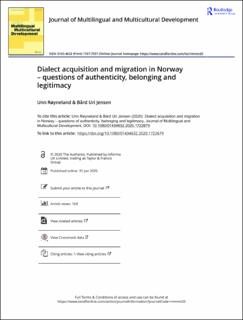Dialect acquisition and migration in Norway – questions of authenticity, belonging and legitimacy
Peer reviewed, Journal article
Published version
Permanent lenke
https://hdl.handle.net/11250/2722240Utgivelsesdato
2020Metadata
Vis full innførselSamlinger
Originalversjon
Journal of Multilingual and Multicultural Development. 2020, 1-17 10.1080/01434632.2020.1722679Sammendrag
Norway is known for its dialect diversity and also for the fact that dialects, on the whole, are cherished and used within all social domains and by people in all social strata. Previous studies indicate that also immigrants to Norway tend to acquire and use local speech, and that this generally is positively perceived. However, language alone may not always be enough to be accepted as someone who belongs and claims of local identity may be rejected. This article reports on a study of attitudes towards immigrants’ use of dialect by a large number of high school students from six different urban and rural places in Eastern and Western Norway. In order to examine the extent to which adolescents with an immigrant background are seen as legitimate and entitled users of local speech, a visual-verbal-guise and an extensive online questionnaire were designed and focus group interviews were conducted. In the study we ask whether adolescents with an immigrant background are evaluated differently than their non-immigrant peers while speaking the same variety, and whether dialect has an impact on how ‘foreign’ or ‘Norwegian’ they are perceived to be.
Beskrivelse
© 2020 The Author(s). Published by Informa UK Limited, trading as Taylor & Francis Group.
This is an Open Access article distributed under the terms of the Creative Commons Attribution-NonCommercial-NoDerivatives License (http://creativecommons.org/licenses/by-nc-nd/4.0/), which permits non-commercial re-use, distribution, and reproduction in any medium, provided the original work is properly cited, and is not altered, transformed, or built upon in any way.

